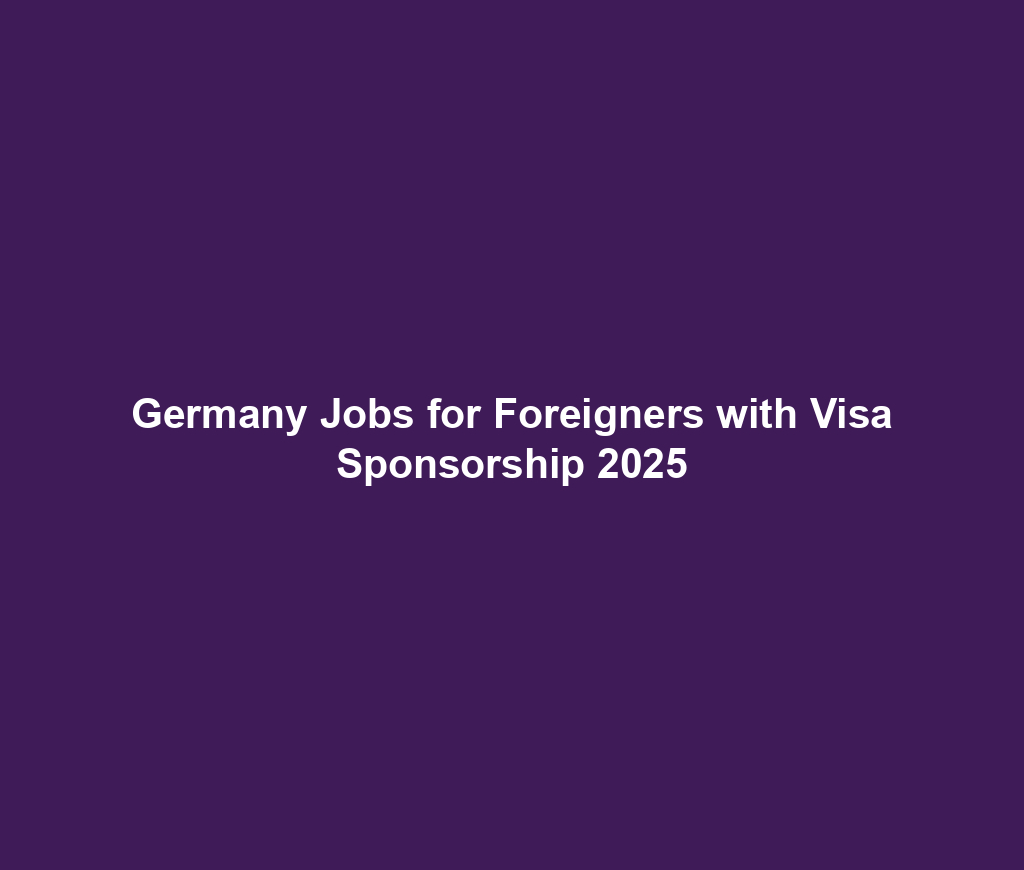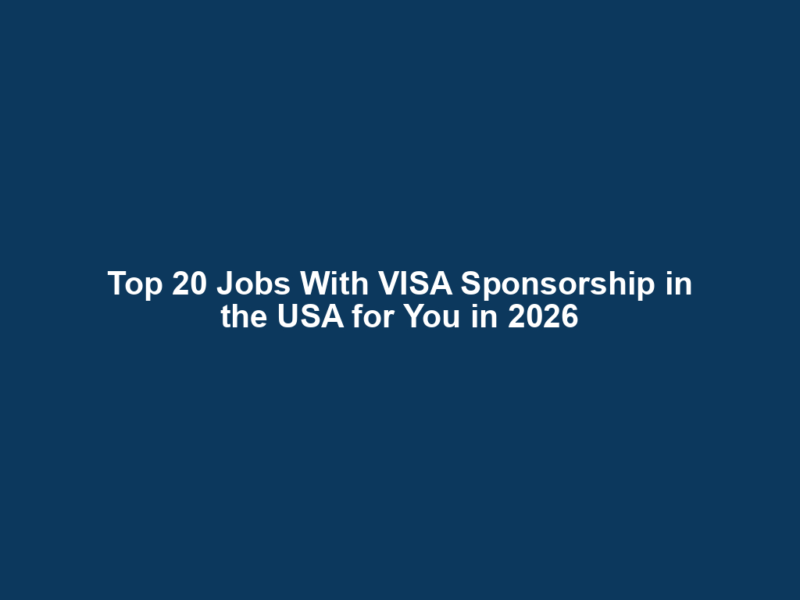In 2025, Germany remains one of the best destinations for skilled workers worldwide.
With a booming economy, high demand for professionals across multiple sectors, and a well-structured immigration system, Germany provides incredible opportunities for foreigners seeking stable, high-paying jobs.
Among the most attractive pathways is Germany jobs with visa sponsorship, which allows qualified professionals to secure employment while gaining the legal right to live and work in the country.
This comprehensive guide explores the landscape of Germany jobs for foreigners 2025, focusing on in-demand sectors, salary expectations, application processes, and strategies to maximize your chances of securing a role with visa sponsorship.
Whether you are in IT, healthcare, engineering, education, or skilled trades, Germany has opportunities designed for international talents who want to contribute to its workforce while building a successful life abroad.
Why Germany is Attracting Foreign Workers in 2025
Germany has consistently been one of Europe’s strongest economies, and in 2025 the demand for skilled labor is at an all-time high.
With an aging population, the country faces workforce shortages across healthcare, IT, construction, manufacturing, and education.
The government has responded with policies that make it easier for non-EU citizens to migrate legally, provided they meet skill and experience requirements.
For many foreigners, Germany offers a mix of benefits:
- Competitive salaries across multiple industries.
- Work-life balance supported by regulated working hours and generous leave policies.
- Visa sponsorship opportunities that allow long-term settlement.
- Pathways to permanent residence and citizenship after a certain number of years working in Germany.
- Global career advancement since German companies are leaders in innovation and technology.
Top Industries Hiring Foreigners with Visa Sponsorship in 2025
Not every industry in Germany offers visa sponsorship, but several sectors actively recruit foreign workers. Below are the key industries with growing opportunities in 2025:
1. Information Technology (IT) and Software Development
The IT sector continues to dominate job openings for foreigners. Germany’s digital transformation goals and booming tech startups have created high demand for:
- Software developers
- Cybersecurity experts
- Data analysts and data scientists
- Cloud computing specialists
- AI and machine learning engineers
Companies like SAP, Siemens, and Deutsche Telekom, along with numerous startups, sponsor visas for skilled IT professionals.
2. Healthcare and Nursing
Germany faces a critical shortage of nurses, caregivers, and medical practitioners due to its aging population. Hospitals, nursing homes, and healthcare agencies actively sponsor visas for foreigners who meet qualifications. Common roles include:
- Registered nurses
- Senior caregivers
- Medical technicians
- Physiotherapists
Healthcare professionals also benefit from structured training programs and government-supported integration initiatives.
3. Engineering and Technical Fields
Engineering has always been one of Germany’s core strengths, and foreign engineers are welcomed to fill skill gaps in:
- Mechanical engineering
- Automotive engineering
- Electrical engineering
- Civil engineering
- Chemical engineering
Companies in automotive, renewable energy, and construction industries often provide visa sponsorship to attract the right talent.
4. Manufacturing and Skilled Trades
Germany’s manufacturing industry is expanding with roles for machinists, welders, electricians, and technicians. Skilled trades are now part of the government’s priority list for foreign recruitment.
5. Education and Research
Foreign lecturers, professors, and researchers are also in demand, especially in STEM fields. German universities and research institutions frequently sponsor visas for qualified international candidates.
Germany Visa Sponsorship Explained
Visa sponsorship means that a German employer is willing to hire you and support your visa application by providing the necessary documents required by immigration authorities. This simplifies the process, as it demonstrates that you already have a valid job offer and meet Germany’s labor market needs.
There are several types of visas that fall under this category:
- EU Blue Card – For highly skilled workers with a minimum salary threshold.
- Work Visa – For professionals with a valid job offer but below the EU Blue Card threshold.
- Job Seeker Visa – Allows skilled professionals to enter Germany for up to 6 months to search for a job.
- Vocational Training Visa – For younger applicants who want to undergo training in Germany while working.
Eligibility Requirements for Foreigners
To secure a Germany job with visa sponsorship in 2025, applicants must typically meet the following requirements:
- A recognized degree, diploma, or vocational qualification.
- Relevant work experience in the chosen industry.
- Proof of financial stability if applying for a job seeker visa.
- Basic to advanced German language skills, depending on the industry (though many IT jobs require only English).
- No criminal record and proof of good health.
Salary Expectations for Sponsored Jobs in 2025
Salaries in Germany vary by sector, qualifications, and location. On average, here is what foreigners can expect in 2025:
- IT and software developers: €55,000 – €80,000 annually
- Healthcare workers (nurses/caregivers): €35,000 – €50,000 annually
- Engineers: €50,000 – €75,000 annually
- Skilled trades: €30,000 – €45,000 annually
- Professors/researchers: €60,000 – €85,000 annually
Some visa categories, such as the EU Blue Card, require a minimum salary threshold (around €45,000 to €58,000 depending on the profession) to qualify.
Step-by-Step Application Process
Applying for a job with visa sponsorship in Germany involves several key steps:
Step 1: Research In-Demand Jobs
Focus on industries actively hiring foreigners. Use job portals, German company websites, and international recruitment platforms.
Step 2: Prepare Your CV and Cover Letter
German employers expect detailed CVs, often longer than one page, highlighting academic qualifications, work experience, and technical skills.
Step 3: Apply for Jobs Offering Sponsorship
Target postings that specifically mention visa sponsorship. Networking on LinkedIn and joining Germany-based job groups increases your chances.
Step 4: Secure an Employment Contract
Once hired, your employer will issue a contract and sponsorship documents, which you will submit during your visa application.
Step 5: Apply for Your Visa
Submit your visa application at the nearest German embassy or consulate, including all required documents: job offer, qualifications, proof of accommodation, and financial means if needed.
Step 6: Relocate to Germany
After visa approval, you can travel to Germany and begin your employment. Within two weeks, you must register your residence and apply for a residence permit at the local immigration office.
Tips to Increase Your Chances of Getting Hired
Competition for sponsored jobs can be high. These strategies improve your chances:
- Learn German to at least B1 level to open more job opportunities.
- Highlight internationally recognized certifications on your CV.
- Tailor your application to German standards, avoiding generic cover letters.
- Use networking platforms like LinkedIn to connect with German employers and recruiters.
- Apply early, as visa processes can take months.
Relocation and Living in Germany
Foreign workers relocating to Germany with visa sponsorship benefit from several advantages:
- Housing: Most employers provide guidance in finding accommodation.
- Healthcare: Workers are required to have health insurance, usually provided by employers.
- Integration courses: Sponsored employees can take government-supported language and cultural courses.
- Family reunification: Many visas allow sponsored workers to bring family members to Germany.
Challenges Foreign Workers Might Face
While opportunities are plenty, some challenges include:
- Language barriers in industries outside IT.
- Competition from EU citizens who do not need visas.
- Delays in visa processing due to high demand.
- Adjusting to cultural differences in the workplace.
Future Outlook for Foreign Workers in Germany
Germany’s government projects labor shortages in multiple industries through 2030. This means opportunities for foreigners are expected to increase further.
Policy changes in 2025 have already streamlined visa processes, making it easier for skilled workers to migrate.
With industries like renewable energy, IT, and healthcare expanding, foreigners can expect long-term opportunities backed by structured immigration support.
Frequently Asked Questions (FAQs)
1. Who can apply for visa sponsorship jobs in Germany in 2025?
Any skilled foreign professional who meets the qualifications for a role in demand in Germany can apply. This includes IT specialists, healthcare workers, engineers, teachers, and hospitality staff. You must also meet requirements such as language proficiency, valid work contracts, and proof of skills or education.
2. Do I need to speak German to get a job with visa sponsorship in Germany?
Yes, in most cases, knowing German significantly improves your chances of being hired. For healthcare, education, and customer-facing roles, German is mandatory. However, some IT and international company jobs allow English speakers, though basic German skills remain an advantage.
3. How much is the salary for foreign workers in Germany?
Salaries vary by sector. IT specialists may earn €45,000–€65,000 per year, healthcare workers around €30,000–€45,000, engineers €50,000+, and hospitality workers €24,000–€30,000. With visa sponsorship, salaries usually meet the minimum wage thresholds required for work permits and the EU Blue Card.
4. What is the EU Blue Card and how does it relate to visa sponsorship jobs?
The EU Blue Card is a special residence and work permit for highly skilled foreign professionals in the EU. If your job offer meets the salary threshold (about €45,300 in 2025 or €41,000 in shortage occupations), you may qualify for this card, which offers easier permanent residency options.
5. Can I bring my family if I get a visa sponsorship job in Germany?
Yes. Most visa sponsorship programs allow family reunification. Your spouse and children can join you in Germany, with spouses often granted work rights as well.
6. How long does the visa sponsorship process take?
The process can take anywhere from 6 weeks to 6 months, depending on the type of visa, embassy processing times, and employer documentation. Applying early and submitting complete documents helps avoid delays.
7. What documents are needed for visa sponsorship in Germany?
Common documents include a valid job contract, passport, proof of qualifications, German or English language certificates, health insurance, proof of accommodation in Germany, and a completed visa application form.
8. Are visa sponsorship jobs in Germany free?
Yes. A legitimate employer offering sponsorship will not charge you for the visa process. However, you may need to pay embassy application fees, medical checks, or document translations. Be cautious of scams demanding upfront money for job offers.
9. What sectors have the most visa sponsorship opportunities in 2025?
Key sectors include IT, engineering, healthcare, construction, education, logistics, and hospitality. Germany faces labor shortages in these industries, creating strong demand for foreign workers.
10. Can students in Germany apply for visa sponsorship jobs?
Yes. International students who graduate from German universities can remain in the country to seek employment. If they secure a qualifying job, they can transition to a visa sponsorship job or EU Blue Card.
11. What mistakes should I avoid when applying for sponsorship jobs in Germany?
Avoid applying without tailoring your CV to German standards, submitting incomplete documentation, ignoring language requirements, or falling for fraudulent recruiters. Always verify the employer and embassy guidelines.
12. Do I need health insurance before moving to Germany?
Yes. Health insurance is mandatory in Germany, even for visa applications. You must show proof of valid health insurance coverage before your visa can be approved.
13. How competitive are visa sponsorship jobs in Germany?
Competition depends on the sector. IT and healthcare are highly in demand with less competition, while business roles may be more competitive. Having in-demand skills, certifications, and German language ability boosts your chances.
14. Can I switch jobs after getting visa sponsorship?
Yes, but you must follow the conditions of your visa or work permit. If you switch to a new employer, you may need to inform immigration authorities and ensure the new contract still qualifies for sponsorship or EU Blue Card status.
15. Is Germany better than other EU countries for visa sponsorship jobs?
Germany is considered one of the best because of its strong economy, high salaries, and structured immigration policies. It also offers a pathway to permanent residency and citizenship, making it very attractive for foreign professionals.
Conclusion
In 2025, Germany jobs for foreigners with visa sponsorship represent one of the most promising career pathways for skilled professionals worldwide.
With high salaries, strong demand in healthcare, IT, engineering, and skilled trades, and well-structured visa options, Germany continues to be a top destination for international workers.
While competition is strong, applicants who meet qualifications, prepare strong applications, and adapt to German standards stand the best chance of success.
If you are serious about building a global career, then 2025 is the year to take the leap. By targeting industries in demand, improving your German language skills, and applying to employers ready to provide visa sponsorship, you can secure not just a job but a long-term future in one of Europe’s strongest economies.


